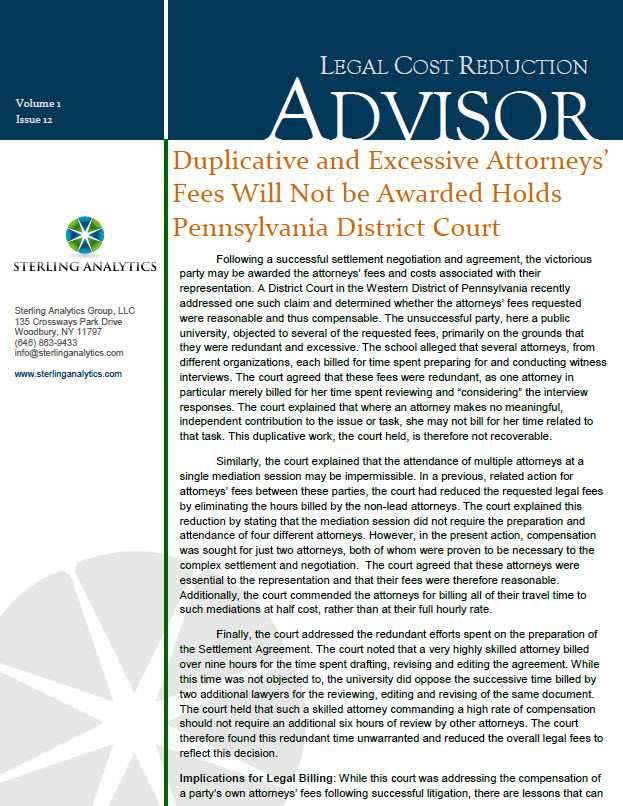Following a successful settlement negotiation and agreement, the victorious party may be awarded the attorneys’ fees and costs associated with their representation. A District Court in the Western District of Pennsylvania recently addressed one such claim and determined whether the attorneys’ fees requested were reasonable and thus compensable. The unsuccessful party, here a public university, objected to several of the requested fees, primarily on the grounds that they were redundant and excessive. The school alleged that several attorneys, from different organizations, each billed for time spent preparing for and conducting witness interviews. The court agreed that these fees were redundant, as one attorney in particular merely billed for her time spent reviewing and “considering” the interview responses. The court explained that where an attorney makes no meaningful, independent contribution to the issue or task, she may not bill for her time related to that task. This duplicative work, the court held, is therefore not recoverable.
Similarly, the court explained that the attendance of multiple attorneys at a single mediation session may be impermissible. In a previous, related action for attorneys’ fees between these parties, the court had reduced the requested legal fees by eliminating the hours billed by the non-lead attorneys. The court explained this reduction by stating that the mediation session did not require the preparation and attendance of four different attorneys. However, in the present action, compensation was sought for just two attorneys, both of whom were proven to be necessary to the complex settlement and negotiation. The court agreed that these attorneys were essential to the representation and that their fees were therefore reasonable. Additionally, the court commended the attorneys for billing all of their travel time to such mediations at half cost, rather than at their full hourly rate.
Finally, the court addressed the redundant efforts spent on the preparation of the Settlement Agreement. The court noted that a very highly skilled attorney billed over nine hours for the time spent drafting, revising and editing the agreement. While this time was not objected to, the university did oppose the successive time billed by two additional lawyers for the reviewing, editing and revising of the same document. The court held that such a skilled attorney commanding a high rate of compensation should not require an additional six hours of review by other attorneys. The court therefore found this redundant time unwarranted and reduced the overall legal fees to reflect this decision.
Implications for Legal Billing: While this court was addressing the compensation of a party’s own attorneys’ fees following successful litigation, there are lessons that can be derived from this case for legal billing more generally. The court explained that hours that are not generally billed to one’s own client may not be billed to one’s adversary and therefore the reductions they found here can be true of all legal representation. The problem of redundant and duplicative fees that arose in this case is especially common when there is more than one firm or organization providing representation. While this may allow for specialization of issues and experience, the client runs the risk of paying each attorney for the same task. Therefore it is especially important that the client review the bills of each firm simultaneously to ensure he is not being improperly charged by multiple attorneys. Similarly, the client may provide billing guidelines ahead of the representation that limit the number of attorneys that may bill for attendance at a single conference, meeting or trial. As this court explained, the attendance of necessary attorneys is compensable, but a client should not be required to pay for multiple attorneys who do not provide any meaningful additions to their representation.
Another lesson to be learned from this case involves the drafting and subsequent review and editing of documents during the legal representation. This court held that a document drafted by a skilled attorney does not warrant an additional six hours of review and revision. It is therefore important to observe the time spent by each attorney revolving around the creation of a single document. This objection may require more diligent review on the part of the client, but can prove beneficial if it is found that several attorneys are billing for the production of one item. By taking these and other similar measures to reduce unwarranted attorneys’ fees, a client has the potential to save a significant amount of money on his legal representation.
* Choike v. Slippery Rock University of Pennsylvania, 2010 WL 4614610 (W.D. Pa. 2010). Full copies of court decisions may be available through counsel or through various Internet links or paid services.
By Lauren Stulmaker


